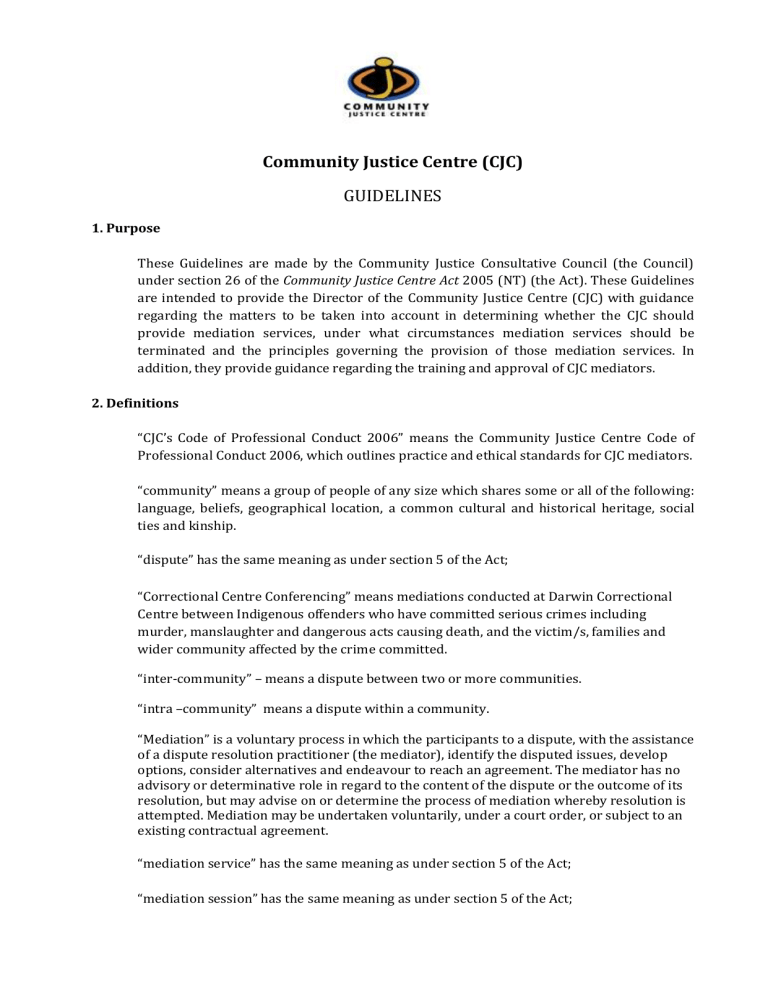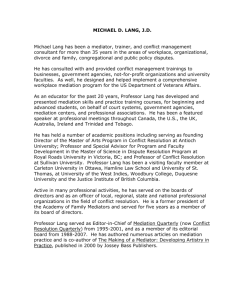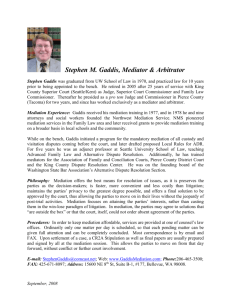word

Community Justice Centre (CJC)
GUIDELINES
1. Purpose
These Guidelines are made by the Community Justice Consultative Council (the Council) under section 26 of the Community Justice Centre Act 2005 (NT) (the Act). These Guidelines are intended to provide the Director of the Community Justice Centre (CJC) with guidance regarding the matters to be taken into account in determining whether the CJC should provide mediation services, under what circumstances mediation services should be terminated and the principles governing the provision of those mediation services. In addition, they provide guidance regarding the training and approval of CJC mediators.
2. Definitions
“CJC’s Code of Professional Conduct 2006” means the Community Justice Centre Code of
Professional Conduct 2006, which outlines practice and ethical standards for CJC mediators.
“community” means a group of people of any size which shares some or all of the following: language, beliefs, geographical location, a common cultural and historical heritage, social ties and kinship.
“dispute” has the same meaning as under section 5 of the Act;
“Correctional Centre Conferencing” means mediations conducted at Darwin Correctional
Centre between Indigenous offenders who have committed serious crimes including murder, manslaughter and dangerous acts causing death, and the victim/s, families and wider community affected by the crime committed.
“inter-community” – means a dispute between two or more communities.
“intra –community” means a dispute within a community.
“Mediation” is a voluntary process in which the participants to a dispute, with the assistance of a dispute resolution practitioner (the mediator), identify the disputed issues, develop options, consider alternatives and endeavour to reach an agreement. The mediator has no advisory or determinative role in regard to the content of the dispute or the outcome of its resolution, but may advise on or determine the process of mediation whereby resolution is attempted. Mediation may be undertaken voluntarily, under a court order, or subject to an existing contractual agreement.
“mediation service” has the same meaning as under section 5 of the Act;
“mediation session” has the same meaning as under section 5 of the Act;
2
“mediator” has the same meaning as under section 5 of the Act;
“National Mediator Accreditation System (NMAS) Approval Standards” are the standards for mediators seeking approval under the National Mediator Accreditation System, maintained by the Mediator Standards Board.
“National Mediator Accreditation System (NMAS) Practice Standards” are the standards for mediators operating under the National Mediation Accreditation System, maintained by the
Mediator Standards Board;
“parties” has the meaning as under section 5 of the Act;
3. Principles Governing the Provision of Mediation Services
The CJC provides mediation services to the community to help people resolve their own disputes. Mediation services provided must be free, voluntary for all parties, timely and easy to use. Recognising that the CJC provides a free, community-based service, the CJC aims to provide mediation services for the whole community in an equitable manner.
All mediation services provided by the CJC must be consistent with the principles outlined in the National Mediator Accreditation System (NMAS) Approval Standards & Practice
Standards and the CJC Code of Professional Conduct 2006.
The CJC recognises that it operates within a culturally diverse population and that culturally appropriate processes should be used in appropriate circumstances. In particular any mediation services being undertaken within Indigenous communities or involving
Indigenous persons need to utilise and recognise any existing capacity and mediation skills within the relevant Indigenous community to resolve their own disputes drawing from their own skills, knowledge, culture and law.
4. Provision of Mediation Services
In deciding whether or not to provide mediation services, the Director must take into account, but is not limited to, the following:
(1) Whether the nature of the dispute falls within the following categories:
(a) Neighbourhood. This includes but is not limited to disputes involving trees, fences, animals and noise between neighbours;
(b) Housing. For example, disputes between landlords and tenants; disputes between co-tenants; body corporate matters;
(c) Relationships between family members;
(d) Intra-community;
(e) Inter-community;
(f) Small claims & civil claims;
(g) Not-for-profit governance. This includes but is not limited to committees, clubs and incorporated associations whose members are in conflict;
(h) Disputes referred by a Court or Tribunal under relevant legislation;
3
(i) Correctional Centre Conferencing;
(2) The Director may, but is not required to, accept a request for mediation services that falls outside of the above categories in circumstances where there are no other appropriately qualified organisations or individual mediators able to provide mediation services. In deciding whether to provide mediation services in such circumstances the
Director must take into account all other considerations outlined in these Guidelines.
(3) The Director may, but is not required to, accept a request for mediation services for a workplace dispute only if Employment Assistance Providers provides a written referral to the Director stating that they are unable to provide mediation services.
(4) The Director must not accept any request to provide mediation services for disputes under the Family Law Act 1975 (Cth)
(5) Whether the CJC has the human and financial resources, or is able to obtain those resources in a reasonable period of time. In making this assessment the Director may take into account: a.
the anticipated period of time that mediation services will be required for ; b.
the location of the parties to the dispute; c.
whether in the Director’s opinion the content of the dispute or the parties reasons for seeking mediation services are frivolous and/or vexatious; d.
whether other mediation or appropriate dispute resolution services are available; e.
whether the party or parties requesting mediation services have the capacity and resources to pay a private mediator.
(6) Whether the CJC and its panel of mediators have the skills and expertise to conduct the mediation to the standard required under the NMAS Practice Standards.
5. Termination of Mediation Services
(1) The Director may choose to terminate mediation services and/or a mediation session at any point if he or she considers that: a) a mediator has breached their professional obligations under the NMAS or the
CJC’s Code of Professional Conduct. b) a party or a CJC mediator has breached the terms of the CJC’s Agreement to
Mediate. c) the Director, either through direct contact with the parties or following consultation with CJC mediators, forms the view that the dispute is not suitable for mediation. The reasons that the Director may form a view that the dispute is not suitable for mediation include but are not limited to:
(i) Parties are not coming to mediation in good faith;
4
(ii) Parties are not willing to negotiate;
(iii) Parties are not willing to sign and commit to the terms of the CJC’s
Agreement to Mediate;
(iv) Parties are not able to represent their interests and/or do not have the authority to settle the dispute;
(v) There are significant issues of power imbalance;
(vi) There are legitimate concerns about the likelihood of violence to the parties and/or the mediators or other third parties.
6.
Mediation training
(1) “Mediation training” means a mediation training course that meets the ‘Threshold
Training and Education Requirements’ as outlined in the NMAS Approval Standards.
Mediation training does not include professional development sessions, workshops, community education or other sessions conducted by the CJC.
(2) The CJC may deliver mediation training for the purpose of:
(a) providing mediation services;
(b) promoting mediation as a way of resolving disputes;
(c) ensuring that CJC mediators hold the prescribed qualifications for a mediator.
(3) Mediation training is to adhere to the NMAS Approval Standards.
7.
Accreditation, Re-accreditation & Appointment of Mediators
(1) The accreditation and re-accreditation of mediators is to be done in accordance with the
NMAS Approval Standards & Practice Standards.
(2) The appointment of mediators for the provision of mediation services is to be done in accordance with section 10 of the Act.







